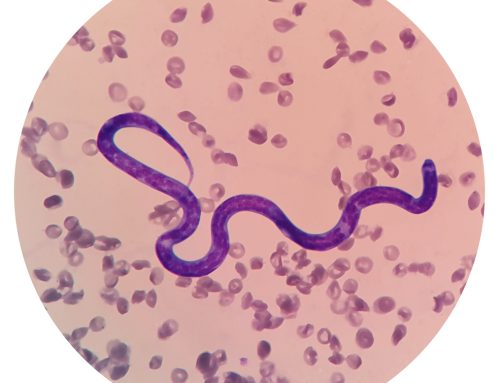As the number of ticks, fleas, mosquitoes, and other insects rises, the diseases these pests carry also increase. Many of the diseases, such as heartworm, can be devastating for your pet. Misconceptions abound about this particular disease, so we want to set the story straight about its cause, effects, prevention, and treatment.
Q: I don’t see any worms in my pet’s stool, so how can she have heartworms?
A: Heartworms differ from other “worms.” Unlike roundworms, whipworms, and tapeworms, they do not live in the animal’s intestine and do not pass through stool. Heartworms are found in the heart and the major surrounding blood vessels and can be diagnosed only through a blood sample.
Q: Can my pet transmit heartworm disease to other animals or people?
A: Your pet cannot pass heartworms directly to another animal or to people—only infected mosquitoes can transmit heartworm disease. The mosquito, which is necessary for the heartworm’s life cycle, must eat from an infected animal, and the heartworm must develop from the immature stage to the infective stage before it can be passed on to another unsuspecting victim.
Q: My pet never goes outside, so how could she possibly have heartworm disease?
A: Airtight homes do not exist, and mosquitoes, spiders, and flies can easily get inside even the most buttoned-up homes. Every time you open your door or open a window with a tiny tear in the screen, a mosquito can zip in, intent on making a meal out of your pet.
Q: Is my cat safe from heartworm disease?
A: Cats can be infected with heartworms, just like dogs, ferrets, and other mammals. But, unlike dogs, only about 10 percent of cats develop the adult-stage heartworms, and only one or two adult heartworms will live in your cat, while hundreds can live in a dog. Sadly, there is no approved treatment for this disease in cats, and even such a small number of adult heartworms can cause sudden death.
Q: Does my pet need heartworm prevention only during warmer months?
A: To fully protect your pet, we recommend year-round heartworm prevention. Mosquitoes love to enjoy your home’s warmth in winter and can easily infect your pet at that time.
Q: Heartworm prevention is too expensive. Why should I consider year-round prevention?
A: Prevention is significantly less expensive than treatment for heartworm disease. Heartworm preventives average $10 per month, whereas treatment can cost more than $1,000. Your pet will need X-rays, bloodwork, and closely monitored hospitalization, as well as painful injections deep into the muscles in the back. Also, irreversible scarring in the heart and surrounding blood vessels will always be present. When you add up all these costs, heartworm prevention seems priceless.

Q: Why should I test my pet annually when she takes heartworm prevention year-round?
A: Pets can be tricky with medications. Some may lure you into thinking they swallowed the tablet, only for you to discover hours later a soggy pill in the carpet. Other pets may squirm and struggle while you apply topical prevention. It is impossible to guarantee that your pet receives her full dose of heartworm prevention each month. Annual heartworm testing can provide an extra warranty, and peace of mind, because if your pet contracts heartworm disease while you are using the correct prevention, manufacturers will pay for treatment, as long as you can provide records of year-round prevention and annual testing.
Still have lingering questions regarding heartworm disease in your pet?Give our office a call









Leave A Comment